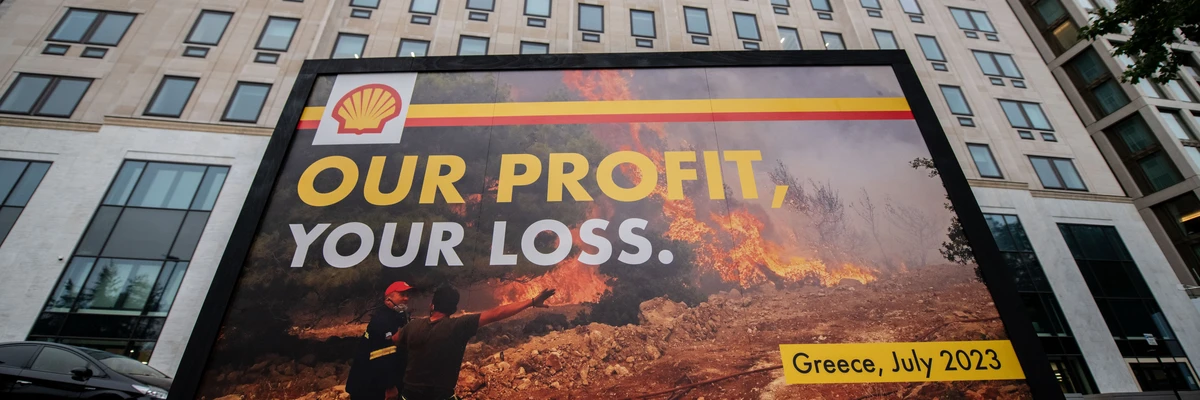Fossil Fuel Firms Flock to Conservative Party Conference
Original article by Joey Grostern and Sam Bright republished from DeSmog.
Influential right-wing groups are set to host events featuring major polluters, days after Prime Minister Rishi Sunak watered down green targets.

A number of oil and gas firms have been announced as the hosts of stands and events at this year’s Conservative Party conference.
The conference, which is being held from 1 to 4 October in Manchester, will play host to the likes of BP, British Gas’ parent company Centrica, petrochemical giant Valero, and Drax – the UK’s largest CO2 emitter.
Events hosted by the companies will cover a range of energy and climate issues, and will feature senior Conservative MPs and ministers.
A range of influential right-wing organisations will co-host the panels. They include the Spectator magazine and groups based in and around Westminster’s Tufton Street, home to a network of opaquely funded, free market think tanks with a history of criticising climate action and pushing for more fossil fuel exploration.
This news comes as Prime Minister Rishi Sunak this week announced several delays to the government’s net zero policies. Sunak announced on Wednesday that a ban on the sale of new petrol and diesel vehicles will be pushed back from 2030 to 2035, while he also watered down schemes to phase out gas boilers and scrapped new energy efficiency regulations on rented homes.
Dozens of organisations will be running stalls at the Tory conference, including a number of fossil fuel firms and major polluters. These include oil giant BP, petrochemical manufacturer INEOS, and Drax, which operates the UK’s single most polluting power station and has actively attempted to influence government energy policy in its favour.
A “Hydrogen Zone” stand which “showcases what the hydrogen economy could deliver for the UK by 2030” will also exhibit projects from a number of gas extraction and distribution companies including RWE, Centrica, Cadent, Northern Gas Networks, National Gas, SGN, and Wales and West Utilities.
DeSmog has previously revealed that the Conservative Party received £3.5 million in donations from fossil fuel interests and climate science deniers in 2022, while two-thirds of the directors in charge of the party’s multi-million-pound endowment fund have a financial interest in oil, gas, and highly polluting industries.
The CPS
The Centre for Policy Studies (CPS), a Tufton Street think tank, is hosting two separate events at the conference in partnership with gas companies.
Valero, the US-based downstream petroleum company which operates an oil refinery in Pembroke, Wales, is hosting an event with the CPS entitled “How do we decarbonise and remain competitive?” featuring Conservative MPs Gareth Davies and John Penrose.
French gas giant EDF and German-owned energy firm E.ON will also be co-hosting a CPS event asking how energy can be made cheaper. The panel will include Exchequer Secretary to the Treasury Gareth Davies.
The CPS has supported the expansion of fossil fuel exploration. In response to the release of the government’s new “energy security” strategy in April 2022, the think tank included ending the ban on fracking for shale gas in a list of “significant missed opportunities” by the government, along with onshore wind and home insulation.
This followed years of lobbying from the CPS on the subject, including a report in December 2013 entitled, “Why every serious environmentalist should favour fracking”.
In an economic bulletin issued by the CPS in March 2022, the think tank also stated that “we need to continue to support offshore exploration and production activity in the North Sea. As part of this, the government should look at accelerating regulatory approval for upcoming oil and gas projects such as Rosebank… Clair South, Glengorm, Cambo and Bentley”.
The International Energy Agency has stated that new oil and gas exploration is incompatible with net zero.
A DeSmog investigation published earlier this year revealed that three CPS board members have donated £610,000 to the Conservative Party since Rishi Sunak became prime minister.
CPS runs the online publication CapX, which has published a number of articles recently attacking net zero policies. One set of “positive” policy prescriptions featured in a piece by Andrew Hunt included pushes, in place of the “obsession” over net zero, to “force developers to build more beautiful buildings” and “replace ugly road bollards and railings with ‘green street furniture’”.
Vocal climate crisis denier Ross Clark also argued on CapX in February that net zero carries a “perverse incentive to destroy UK jobs”, and that Britain was “highly unlikely” to “get anywhere net zero by 2050”. In another CapX piece, Clark said it would be “impossible” for Britain to electrify its power grid by 2030.
The CPS told DeSmog that, in recent years, it has been “one of the most prominent champions of free-market environmentalism, with a dedicated workstream on net zero.
“Our director, Robert Colvile, has been one of the country’s most prominent advocates of onshore wind and solar, as well as co-authoring the 2019 Conservative Party manifesto, which contained a prominent commitment to net zero.
“Our CapX site offers a platform for robust debate on the policy issues of the day. The most cursory glance at our output would show that this includes publishing many pieces that are strongly supportive of net zero”.
A Spectator Sport
The Spectator magazine will be hosting a Conservative conference event in association with Cadent Gas, discussing public consent for net zero. The event will feature two outspoken climate crisis deniers: Conservative MP Jacob Rees-Mogg who is also a GB News host, and Sherelle Jacobs, a columnist at the Telegraph.
Rees-Mogg is well-known for his anti-net zero views, and was a leading proponent of further fossil fuel extraction during Liz Truss’s short tenure as prime minister.
In August, Rees-Mogg argued that the government should “revisit its approach to net zero” and “cancel the ban” on oil-fired boilers from 2026, points which Sunak mirrored in his recent net zero announcement.
Jacobs has previously argued that climate science is “being manipulated into alarmist fake news,” and more recently claimed that net zero was a “damp squib”.
The Spectator regularly publishes articles attacking net zero and questioning climate science. It hosts the work of notorious climate crisis deniers such as Toby Young, Ross Clark, Brendan O’Neill, Charles Moore, Dominic Lawson, Rod Liddle, Matt Ridley and Rupert Darwall, among others.
An Spectator editorial published in reaction to Sunak’s climbdown on net zero measures claimed that the plan to phase-out the sale of new fossil-powered engines was a “always was a conspiracy against the public, justified on very thin environmental arguments,” and that Sunak’s announcement was “an important step”.
The editorial argued for further climate inaction on the basis that Britain contributes less than 1 percent of total annual greenhouse gas emissions. (This argument has been identified as a common example of the key climate delay tactic of “Whataboutism”, in an influential academic paper published by Cambridge University Press).
The Spectator is also hosting a drinks reception with newly formed UK gas infrastructure operator National Gas.
National Gas is also set to host an event at the Conservative conference on the UK’s “need” for hydrogen entitled “Gassed up”. The event is being co-hosted with the influential centre-right think tank Onward. Several of Onward’s former staff members are now working in Sunak’s government.
German fossil fuel giant RWE, which owns and operates Europe’s second most polluting power plant, will also host an event in association with the Conservative Environment Network (CEN). The event will ask whether wind and solar energy are “energy saviours or a blight on our communities?”. The event will feature Lee Rowley, a minister at the Department for Levelling Up, Housing and Communities.
RWE also claims to be the world’s second largest offshore wind company and Europe’s third-largest renewable energy company.
Centrica is co-hosting an event with the CEN asking whether Britain is “winning or losing” at the “green industrial revolution”.
Liquefied Natural Gas supplier Liquid Gas will also host an event on decarbonising rural areas.
The Spectator, the CEN, Onward and the Conservative Party have been approached for comment.
Original article by Joey Grostern and Sam Bright republished from DeSmog.

